- Home
- Tony Roberts
Casca 48: The Austrian Page 2
Casca 48: The Austrian Read online
Page 2
The suburbs outside had no protection or defenses, so those who lived there had two choices in the event of any approaching enemy; either to flee into the hills south and west of Vienna, or to take shelter behind the walls of the city itself.
Casca and Peter walked along the road that approached from the west, not far from the Danube, passing through the suburb village of Rossau. Soldiers were very much in evidence and both the new arrivals were stopped and questioned as to what they were doing and where they were going. Wagons were rumbling along laden with goods, so the two had to step into the drainage ditches to speak.
Following directions given, they were sent into the city and told to report to the mayor’s palace. The man in charge of recruitment was Burgomaster Liebenburg, since the generals were away leading the army in the field, trying to find the Ottoman army somewhere in Hungary. They got further directions as they went and before long arrived at the building, a large flat-fronted construction set back from the street. There was a doorway set in the middle so the two passed in between two guards and found themselves in a large hallway with a curving staircase ahead with a very thick bannister.
Clerks and staff walked in an unhurried manner across the marble floor, and to the right stood a desk with a clerk seated behind it scribbling on a roll of paper. His head was bent, ignoring the two new arrivals. Casca cleared his throat.
The clerk looked up, irritated. “Yes? How can I help you?”
“We’re here to join the army in defense of the Empire against the Turks.”
“Oh, I don’t know much about that,” the clerk frowned. “Do you have an appointment?”
Casca fought a flush of annoyance that rose up inside him. “Look, both my friend and I have come a long way to be here, so you’d best sign us up or find someone who can.”
“Without an appointment I’m afraid it’s going to be awkward,” the clerk said without a trace of regret. He put his quill down and affected a friendly expression. “If you leave a fee of ten florins each I can probably arrange an appointment this afternoon.”
Casca grimaced in distaste. He had heard that the Hapsburg administration was incredibly corrupt, and here now was evidence of this. He resigned himself to the fact he would have to take much more direct action to get what he wanted, something that always seemed to be necessary, no matter the time or place.
He snaked out a rough, calloused hand and grasped the clerk around the throat, pulling him over the desk and thrust his face in the shocked clerk’s. “Now, listen, scheisskopf! I’m not taking this kind of shit from a lowly turd like you. Get me someone who can make a damned decision.”
The clerk made a curious choking sound, then came the heavy tread of a couple of men behind Casca. “Let him go!”
Casca turned his head and saw a couple of white-uniformed guards with matchlocks, and plugged into the muzzles the new innovation to warfare, a wicked gleaming pointed blade called a bayonet. It had only recently been introduced into the Hapsburg armies, copied from Spain and France, and called a bayonet because they had been first widely manufactured in the French town of Bayonne. It gave the musketeer a weapon that resembled a medieval polearm and one that could be used to skewer opponents after discharging a shot. The only drawback Casca could see was that the plug meant no more shots could be fired until it was removed.
He released the squirming clerk and faced the soldiers. “I want to see your commanding officer.”
“You’ll be seeing him right away, friend,” one of the two replied. “And your comrade, here.”
Peter looked a little confused and more than slightly alarmed. Casca nodded at him. “This is what I wanted to achieve, so don’t worry,” he said softly. Before the soldiers took them away, Casca addressed the red-faced clerk once more. “Next time try to be helpful, and not act like a complete asshole.”
Further words were not possible as the points of the bayonets were jabbed at the two to hand over their weapons, which they did, and then they were marched around the end of the desk and through a large stone archway. A marble-floored corridor lay beyond, punctuated with square pillars inset in the walls. The first door on the left had a placard denoting that this was the office of Hauptmann Kaltenberger.
One of the two soldiers knocked, got permission to enter, and stepped in, speaking for a moment. He came back out and a second person emerged, a lean, aristocratic-looking man with brown eyes, a long brown wig that reached his shoulders, a white cravat and wearing a long red woolen coat with smart silver buttons. He gave Casca and Peter an unfriendly look. “I am told that you have threatened and assaulted on of the Burgomaster’s clerks here in this very building. This is a serious matter.”
“Yes, Captain,” Casca nodded. “He refused to let us see you unless we paid him a bribe.”
Kaltenberger grimaced. “And naturally there were no witnesses to this alleged conversation.” It wasn’t a question, but a statement. “So, before I have the pair of you locked up, do you have anything further to say for yourselves?”
Casca explained why they were there. The captain was shown the duo’s weapons. He sucked in a deep breath. “Volunteers are always welcome, but as you may be aware funding is in short supply and I have had to make do with a reduced complement. Why should I recruit the two of you and not the dozens of others I have had to regretfully turn away?”
“I’m an experienced mercenary,” Casca explained, “capable of firing two shots a minute with this piece,” he pointed at his gun being held by Kaltenberger. “My friend here has come all the way from the Rhineland to help in the fight against the infidel.”
“Hm, a noble reason indeed,” the captain mused, then eyed Casca. “Two shots are expected for all men under my command, so that is not exceptional. Now, if you could demonstrate you are capable of shooting three times, I may find the funds to accommodate both of you in the Vienna garrison.”
Casca sucked on his lower lip. Three shots with a matchlock in a minute was pushing it but he was confident he could do it. “Deal. Where’s the range?”
“Out in the courtyard behind this building.” Kaltenberger passed Casca his gun. “Do you have powder?”
“No. I was hoping to be supplied with it once I was recruited.”
Kaltenberger shot off a rapid set of orders, and one guard returned to his position in the hall while the second marched off to the armory. Peter received his gun and the pair were informed by the captain that funding for his unit came from the Hofkriegsrat – the Austrian Court War Council – which in turn received its funding directly from the treasury. “Since we are recovering from the plague, which only vanished two years ago, and we are short of florins anyway, the treasury cannot give a great deal of money to the armed forces. The main army is in the field under Duke Charles of Lorraine. The emperor has every faith in him.”
Casca felt there wasn’t a huge amount of confidence in Kaltenberger’s words. “Where are they now? Has anyone confirmed where the Ottoman army is?”
“The Duke is in Hungary – that is all you are permitted to know. Ah!” he finished, seeing the second guard return with a bandolier with wooden cartridges of powder dangling from it, and both a powder and a cartridge satchel. Casca put all on, so the bandolier, a wide leather item, hung from his right shoulder and went down to his left hip. The powder satchel hung on a narrow strap from his other shoulder and the cartridge case was looped through his belt and positioned at his back.
The range was out the back in a courtyard with a grassy center and the barracks entrance across the other side, the front of the barracks marked by a series of archways. Kaltenberger led Casca and Peter to the left-hand end and at the other end, fifty paces away, were bales of hay with circular targets resting against these. Other soldiers were there and stopped what they were doing and looked on with interest. The captain produced a pocket watch, a new and expensive item, and flipped open the glass face.
Some of the soldiers came slowly to gather close by, and Peter stood quietly near the ca
ptain, quietly confident that his companion could meet the deadline.
The last piece of equipment needed Casca had, pulling forth from his belt pouch. It was a length of match cord and it was ignited, the end glowing briefly before settling down to a smoldering sullenness. His musket was ready and he held it in his left hand, with the smoking cord in between two of his fingers of the same hand. His right would perform all the loading and shooting functions.
“On my mark,” Kaltenberger said, “you will have one minute to discharge three shots at the targets.” He nodded to his adjutant, a young-looking lieutenant who had emerged from the barracks. The young officer would ensure the men kept back and to mark the shots. The captain looked up at Casca one last time. “Are you ready, soldier?”
“Sir,” Casca answered automatically, his mind already turning to military mode, where procedures were done automatically. Loading and firing were done by drill because of the many parts to it, and to get them familiar soldiers had practiced this repeatedly until they knew it off by rote. Casca had been using this weapon for decades, and it was almost second nature to him now. He recalled the brutal battles of Lutzen and Breitenfeld where the Swedish army he had been part of had slogged it out with the imperial forces.
“Ready,” the captain said, and Casca tensed. “Mark!”
Casca’s mind emptied. Now he was just an automatic being. He hardly thought about what he was doing, he was merely following drill hammered mercilessly into him on the shooting ranges of Stockholm, Stralsund and the battlefields of Poland and Germany. Pan open, little finger flicked in the hole to ensure no old powder was there. Powder satchel, flipped lid off, put nozzle to pan, shake powder into pan, replace lid, release satchel, close pan. Blow excess powder away as he didn’t want to ignite the charge just yet.
Powder bottle, pull lid off, drop powder into muzzle, allow it to drop to the end. Release bottle. Fumble for paper cartridge. Select one, bite one end off, drop contents including ball into muzzle, follow up by cramming the paper in to be used as wadding. Pull forth ramrod, twirl, jab against belt to shorten rod sticking out from his grip, insert into muzzle, thrust hard down, ram once, withdraw rod, twirl, slide back into place beneath muzzle.
Match placed in jaws of trigger mechanism, pressed to make sure it won’t fall out, blow on end to make it glow, test it’ll reach pan, flip pan open, aim, squeeze trigger.
The musket bucked into his shoulder and the flat report echoed across the courtyard. White smoke obscured his vision but he was already beginning the procedure for shot number two. The smell of rotten eggs filled his senses. He was used to all of this.
Kaltenberger eyes his watch and his brows raised. This man was quick!
“Hit, off center to the left,” the lieutenant reported.
Casca took this information in his stride as he poured powder into the pan, then flicked the pan shut. Blow. Powder bottle. He was one with his musket with one purpose, to shoot at the target as fast and as efficiently as he could. Ramrod. The metal bar smoothly rammed charge number two down the muzzle. Twirl.
Peter stood in admiration. Here was someone who knew his craft, knew how to use his musket. There was a flair and flow to the myriad of movements that spoke of years of practice and application.
The second shot smashed into the target.
The soldiers watching began to stand straighter, excitement mounting. Now this was something new! Most of them could fire one or two shots a minute, yet this man was like the wind. They were garrison troops and so not good enough to be out in the field with the main army. Their task was to defend the city from behind stout walls.
“Center, slightly off to the right and high,” the lieutenant reported.
Just a slight adjustment for the final shot. At fifty paces it was hardly difficult to hit the target, even with a musket. Give him a good old yew great bow that the English used a couple of hundred years ago, and he’d make that target look like a hedgehog. Still, this was progress. Or so the inventors insisted. These round musket balls were vicious. They could drive ribs out through the back.
The acrid taste of the black powder made his tongue cringe but he ignored it. It was amazing how quickly one got used to that sort of discomfort. Kaltenberger kept on flicking his eyes up to the reloading man, then down to his watch face. As the hand moved up towards the top the third shot rang out. The captain flicked the glass shut and slipped the watch into his pocket.
“Dead center,” the lieutenant calmly announced.
Casca turned and faced Kaltenberger, his face blackened from the discharged powder.
“Congratulations,” the captain said. “You shot three times within a minute. Welcome to the garrison.”
The men cheered, hats raised into the air.
The eternal mercenary grinned and winked at Peter before saluting Kaltenberger. Now he had been officially recruited, it would be politic to show deference to his superior’s rank.
CHAPTER TWO
The church of St. Michael, the Michaelskirche, rose like a stone sentinel on one side of the St. Michael’s Platz, not far from the Hofburg Palace. It had been for a long time the parish church of the imperial court and was known as zum heiligen Michael.
The apse had once been polygonal but it had been refitted three centuries previously with a Gothic-style choir with three bays, which were now chapels. The smells of candlewax and incense permeated throughout the church, giving it that so recognizable aroma of catholic churches wherever they may be, from Europe to South America.
One of these chapels was dedicated to the Virgin Mary and here knelt a solitary nun, praying, her rosary in both hands. Her head was bent forward in supplication. A newcomer slowly made his way into the bay and hovered for a moment, as if he were uncertain. The nun looked up, her train of thought interrupted, and saw it was a man dressed in the off-white uniform of the military. She looked surprised, then her hazel eyes seemed to widen as she looked over his features.
Peter thought she had the most attractive eyes, big and deep. He knelt alongside her, his hands coming together in prayer, then he stole another look at her. She was not old, perhaps in her early thirties, and her skin was unblemished. She also had quite delicate features so looked possibly younger than she actually was. He looked away, and made the sign of the cross with his right hand, touching his forehead, chest and then both shoulders.
“I would have thought a protestant would not readily visit a catholic church,” the nun said quietly, staring at Peter.
He looked across at her once more. “What does it matter, when bigger concerns are at stake?”
She considered his words, then seemed to accept them. She ran her fingers over the smooth oval-shaped beads of her rosary, fitted together by a stout cord in a circle, with one downward hanging appendage that ended in a small wooden crucifix. “Is he here?”
“Yes. Both of us are in the garrison.”
“Good. You must keep him in sight at all times.”
Peter’s lips tightened in irritation. “I’m aware of my orders. I wasn’t best pleased to be hauled out of Mainz and sent through Germany to meet Casca Longinus on the road to Vienna! I have a family back home, and now I’ve been placed here right in the path of an Ottoman army!”
“Keep your voice down,” she hissed. “Never address him by his full name. What name is he going by here?”
“Carl Lang.”
“Then we shall speak of him by that name. I presume he suspects nothing? He has no idea as to who and what you really are?”
Peter shook his head. “Nothing. He’s just a common soldier, after all. He’s hardly a university scholar.”
The nun shot him a severely disapproving look. “Show him some respect! He’s immortal, he’s fought in more wars than the number of masses you will ever attend, and he has centuries of living to draw experience from. You will defer to him at all times, do I make myself clear? Otherwise I will arrange for you to be sent to somewhere far away from your precious so-called ‘family’, shal
l we say southern Italy? Ours is the only family that matters, do you understand?”
Peter sighed and nodded. “Yes, Sister Margareta. I apologize.”
Margareta considered his words, and her features softened. All he could see of her was her white face, surrounded by the head piece of her habit. “You will continue to contact me here on a regular basis – shall we say every three days or so? I do not expect things to change much here until the Turks arrive.”
“You’re certain they’ll come? The palace has not indicated that they believe this to be so.”
Margareta’s lips twisted into a sneer. They were full and red and Peter wondered what it would be like to kiss them, but he pushed the thought aside. Margareta was a nun and nuns did not indulge in pleasures of the flesh. She spoke. “With the Grand Vizier leading them? This is a major effort by the Sublime Porte. From what I’ve been told, there are, including their vassals, around 120,000 troops. I don’t think they are coming through Hungary just to capture a few border fortresses, do you? No, Vienna is their target and the fools in the Hofburg are more interested in hunting, feasting and carousing to see how much in peril we are here. The moment they realize that, they’ll flee, you mark my words.”
Peter bowed his head once more. He’d listened to pessimistic talk in the barracks from the garrison troops who were demotivated. Corruption was rife and this, combined with a scarcity of funding from the treasury which meant low pay, often resulted in regiments being only half strength. There was another worry, and that was until the previous summer, the defenses of Vienna had been in a poor state. It had only been with the news of the Ottoman’s declaration of war at that time that had prompted the Hofkriegsrat to raise funds for the upkeep of the walls and other defenses.

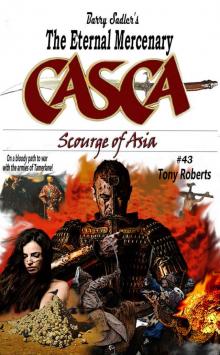 Casca 43: Scourge of Asia
Casca 43: Scourge of Asia The Lombard
The Lombard Casca 49: The Lombard
Casca 49: The Lombard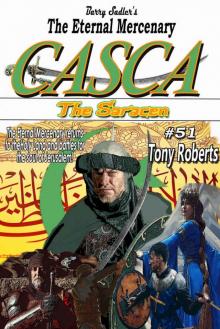 The Saracen
The Saracen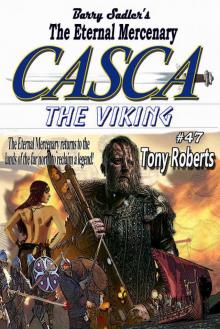 Casca 47: The Viking
Casca 47: The Viking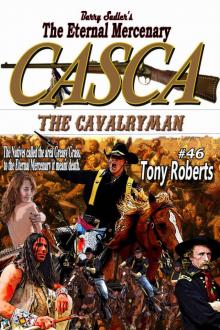 Casca 46: The Cavalryman
Casca 46: The Cavalryman Casca 52- the Rough Rider
Casca 52- the Rough Rider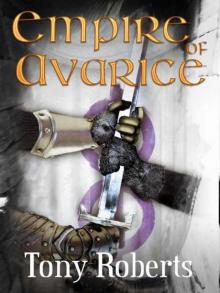 Empire of Avarice
Empire of Avarice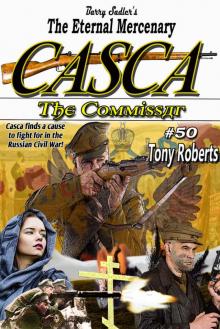 The Commissar
The Commissar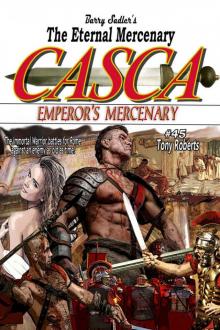 Casca 45: Emperor's Mercenary
Casca 45: Emperor's Mercenary Dark Blade
Dark Blade The Heir of Gorradan (Chronicles of Faerowyn Book 2)
The Heir of Gorradan (Chronicles of Faerowyn Book 2)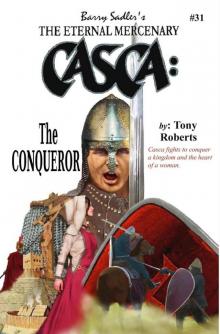 Casca 31: The Conqueror
Casca 31: The Conqueror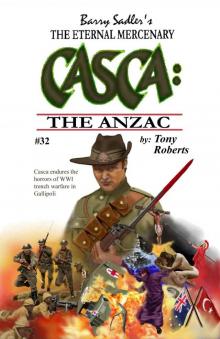 Casca 32: The Anzac
Casca 32: The Anzac The Anzac
The Anzac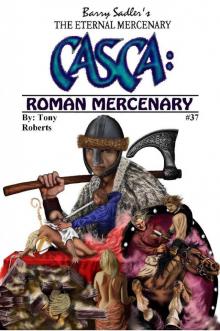 Casca 37: Roman Mercenary
Casca 37: Roman Mercenary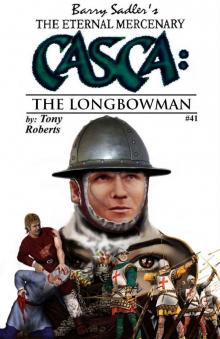 Casca 41: The Longbowman
Casca 41: The Longbowman The Longbowman
The Longbowman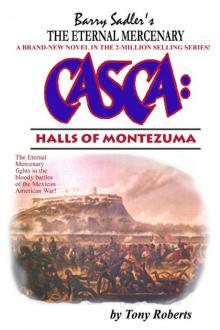 Casca 25: Halls of Montezuma
Casca 25: Halls of Montezuma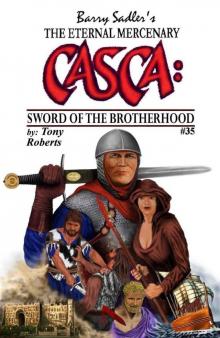 Sword of the Brotherhood
Sword of the Brotherhood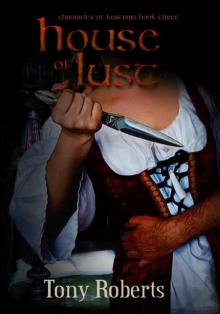 House of Lust
House of Lust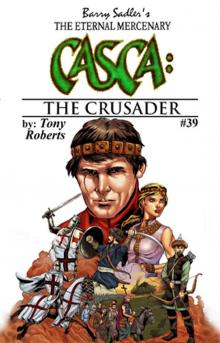 Casca 39 The Crusader
Casca 39 The Crusader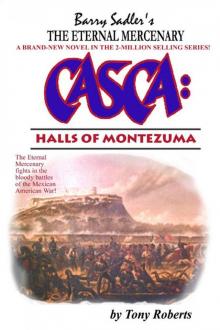 Halls of Montezuma
Halls of Montezuma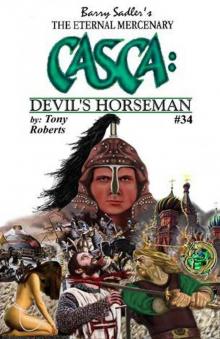 Devil's Horseman
Devil's Horseman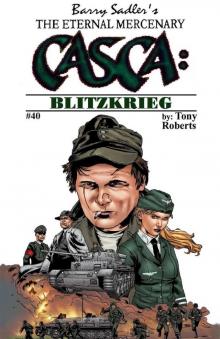 Casca 40: Blitzkrieg
Casca 40: Blitzkrieg Casca 38: The Continental
Casca 38: The Continental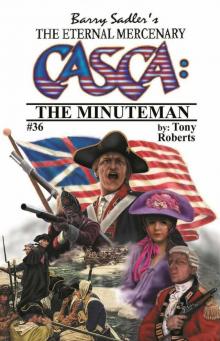 The Minuteman
The Minuteman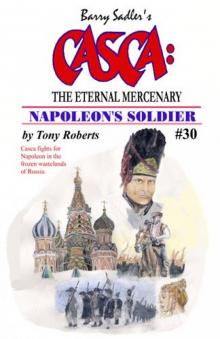 Napoleon's Soldier
Napoleon's Soldier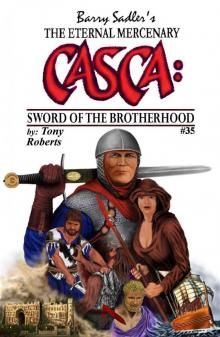 Casca 35: Sword of the Brotherhood
Casca 35: Sword of the Brotherhood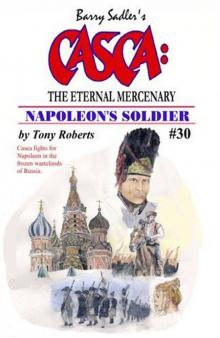 Casca 30: Napoleon's Soldier
Casca 30: Napoleon's Soldier The Continental
The Continental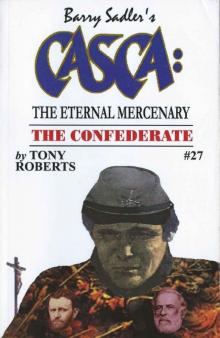 The Confederate
The Confederate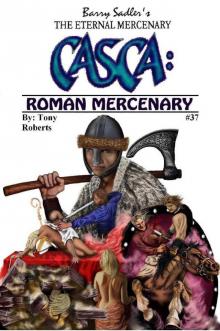 Roman Mercenary
Roman Mercenary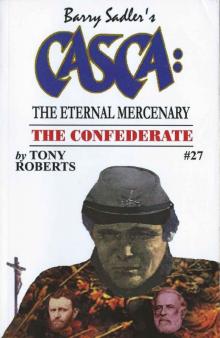 Casca 27: The Confederate
Casca 27: The Confederate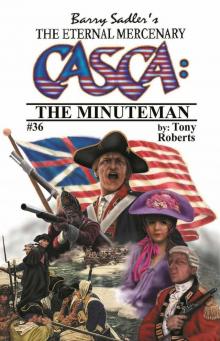 Casca 36: The Minuteman
Casca 36: The Minuteman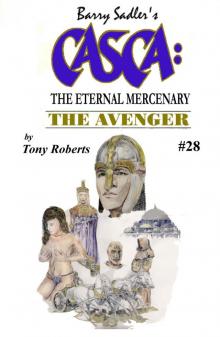 Casca 28: The Avenger
Casca 28: The Avenger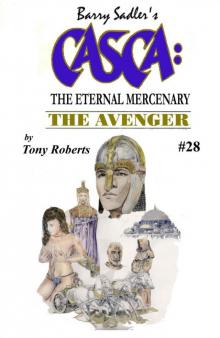 The Avenger
The Avenger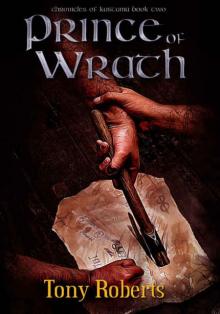 Prince of Wrath
Prince of Wrath